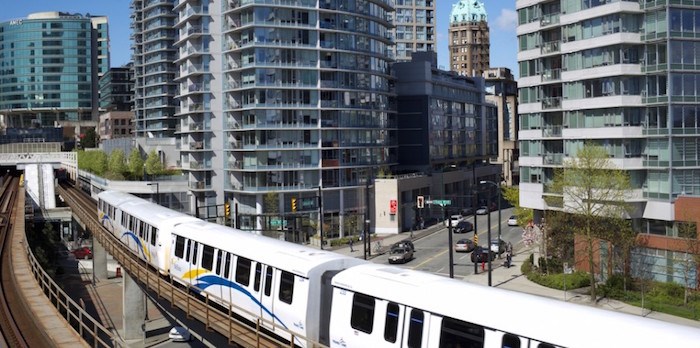In the first days of November, the political attention of the province has shifted away from municipal politics. Provincial representatives are worried about the outcome of the referendum on electoral reform, and the federal Liberal Party is celebrating the third anniversary of its comeback victory, as well as the 12-month countdown for the next countrywide ballot.
 SkyTrain in Vancouver/Shutterstock
SkyTrain in Vancouver/Shutterstock
Over the past few years, housing has consistently topped the charts as the most important issue facing municipalities in the Metro Â鶹´«Ă˝Ół»region. Transportation – in all of its forms – was usually ranked in second place, unless you happen to live in Surrey, where public safety has always been a more paramount concern. But just what to do in order to deal with transportation is still a matter of debate.
It may seem like ages ago, but it was just in the summer of 2015 when most voters in Metro Â鶹´«Ă˝Ół»rejected the idea of an additional school tax to pay for improvements to transit and transportation. At the start of the plebiscite campaign, victory seemed assured for the “Yes” side, which boasted the support of unions, corporations and most municipal governments. When all ballots were cast and counted, 62 per cent of voters in the mail-in ballot said “No” to the proposed tax amendment.
Relying on a sales tax for transit funds, which has worked well in municipalities such as Los Angeles and Denver, was not the way most residents of Metro Â鶹´«Ă˝Ół»wanted to go. Three years later, whether you drive, take public transit, bike or walk, you are still without the infrastructure and safety features that appeared within grasp and were included in the information packages that accompanied your mail-in ballot in 2015.
Late last month, Research Co. asked Metro Vancouverites about specific ways in which transit projects could be funded in Metro Â鶹´«Ă˝Ół»over the next few years. The answers outline a population that is reticent about anything that entails paying more, and decidedly wary of specific concepts.
Not one out of six different ideas to come up with funds to pay for transit managed to get the support of half of residents. The most popular one was tolling bridges, a practice abandoned by the current New Democratic Party (BC NDP) provincial government.
Bringing tolls back is supported by 44 per cent of Metro Â鶹´«Ă˝Ół»residents, and opposed by 53 per cent. Drivers are not that convinced, with 39 per cent voicing support for this idea. But those who commute to school or work through public transit are in favour (52 per cent).
Other jurisdictions around the world have implemented a levy based on the distance travelled by a vehicle in the past year. This idea resonates with 37 per cent of residents, but a majority (55 per cent) disagree. Once again, public transit users were more likely to endorse this concept (43 per cent) than those who drive their own vehicles (31 per cent).
Only a third of Metro Vancouverites (33 per cent) would consent to increasing transit fares to fund transit projects. The level of support is even lower for three other ideas: increasing fuel taxes (30 per cent), increasing property taxes (29 per cent) and tolling roads (26 per cent).
So, long story short, very few residents are currently willing to pay more to use the roads that already exist. Bringing back tolls will be extremely complicated, as the public has now grown accustomed to toll-free driving, and it would not be politically astute for the provincial government to abandon a key campaign promise.
The increase in property taxes to pay for transit projects is extremely popular for Metro Vancouverites who rent (47 per cent support it). As expected, support for this idea plummets among residents who own their home (16 per cent).
At this point, there seems to be no “silver bullet” to make sure that some additional funds are available so that transit projects can be delivered quickly and effectively. No option is popular for residents, and rookie mayors and councillors will have to deal with different challenges.
We can expect a few ribbons to be cut in the next few months. The Â鶹´«Ă˝Ół»extension of SkyTrain to Arbutus and all the way to the Point Grey campus of the University of British Columbia (UBC) is popular. The long-awaited light rail transit (LRT) in Surrey was also backed by a majority of residents before last month’s municipal elections, but incoming Surrey Mayor Doug McCallum has expressed a preference for SkyTrain.
In any case, asking Metro Vancouverites about how to have better transit infrastructure appears to only lead to people wanting someone else to cover costs. Drivers want public transit users to pay more. Transit users are more likely to voice support for drivers to pony up for using the road. Renters want homeowners to dish out more in property taxes. Faced with so many warring factions, it will take a lot of political will to achieve something that resembles unity.


